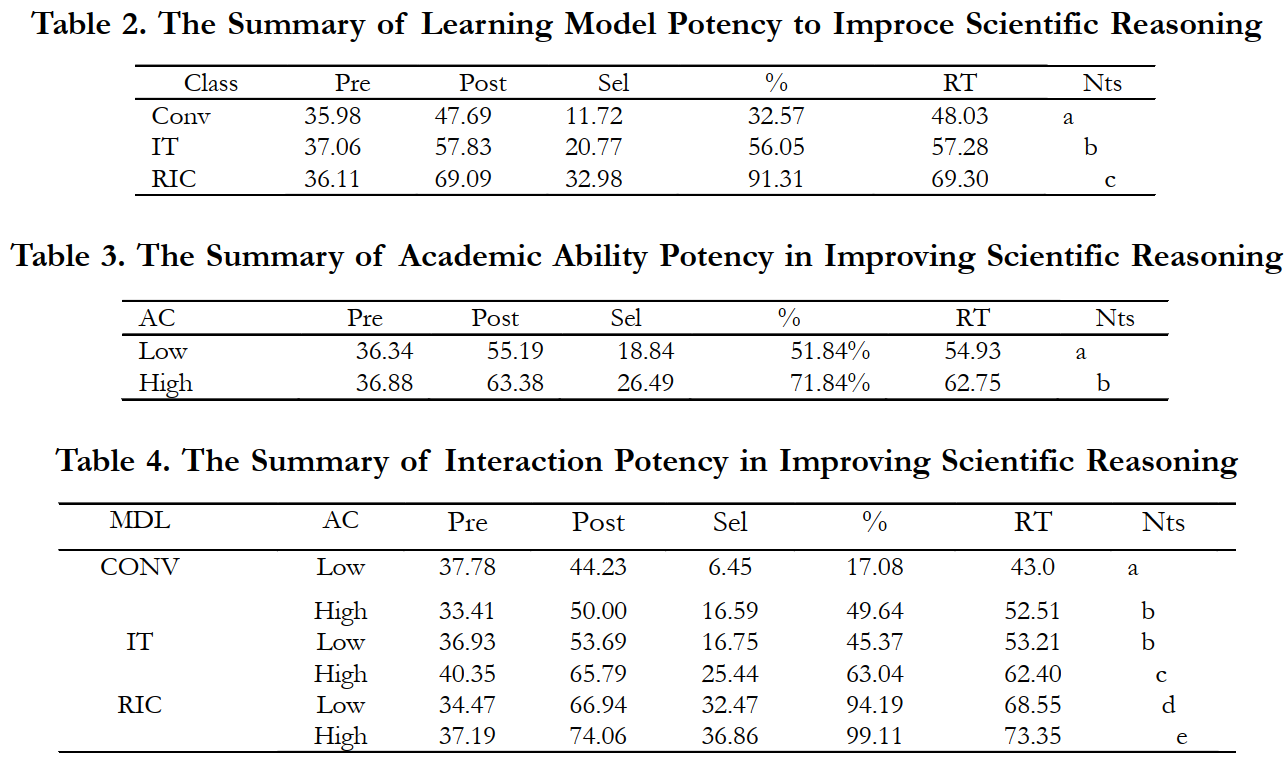
The Potential of RICOSRE in Improving Scientific Reasoning of Students with Different Academic Ability
Abstract
Abstract: The research aims to analyze the potential of the RICOSRE learning model in improving students' scientific reasoning abilities on different academic abilities. This research is a quasi-experimental research. SMAN 1 Malang and SMAN 7 Malang became a place of research with a sample of 188 students. The research design is Noneqivalent pretest - posttest control desaign group. Research data in the form of the acquisition of essay test scores. Essay test results were analyzed using anacova. Based on the research result it is proved that there is a potential of the RICOSRE on students' scientific reasoning abilities on different academic abilities.
Abstrak: Penelitian bertujuan untuk menganalisis potensi model pembelajaran RICOSRE dalam meningkatkan kemampuan penalaran ilmiah siswa dengan kemampuan akademik berbeda. Penelitian ini merupakan penelitian quasi-eksperimien. SMAN 1 Malang dan SMAN 7 Malang menjadi tempat penelitian dengan jumlah 188 siswa sebagai sampel. Data penelitian berupa perolehan skor tes esai. Hasil tes esai dianalisis menggunakan anakova. Berdasarkan hasil penelitian diketahui adanya potensi model pembelajaran RICOSRE terhadap kemampuan penalaran ilmiah siswa pada kemampuan akademik berbeda.
Keywords
Full Text:
PDFReferences
AACU. (2010). Scientific reasoning VALUE rubric, (online) , diakses 05 Februaru 2019. (https://www.aacu.org/sites/default/files/files/VALUE/VALUE_Scientific ReasoningRubric.pdf).
Agustina. (2008). Pembelajaran keterampilan membaca. Padang: Jurusan Bahasa dan Sastra Indonesia. FBSS UNP.
Alberida, H., Lufri, Festiyed, & Barlian, E. (2018). Problem solving model for science learning. IOP Conference Series: Materials Science and Engineering, 335, 012084. https://doi.org/10.1088/1757-899X/335/1/012084
Bybee, R. (2010). A new challenge for science education leaders: Developing 21st century workforce skills. In Science Education Leadership: Best Practices For A New Century , ed. J. Rhoton, 33–49. Arlington, VA: NSTA Press.
Carson, J. (2007). A problem with problem solving: teaching thinking without teaching knowledge. Problem Solving, 8.
Corebima, A. D. (2007). Learning strategies having bigger potency to empowering thinking skill and concept gaining of lower academic student. Proceedings of Redesigning Pedagogy Conference. Nanyang, 28–27.
Ding, L. (2014). Verification of causal influences of reasoning skills and epistemology on physics conceptual learning. Physical Review Special Topics - Physics Education Research, 10(2), 023101. https://doi.org/10.1103/PhysRevSTPER.10.023101
Gopnik, A. (2012). Scientific thinking in young children: theoretical advances, empirical research, and policy implications. Science, 337(6102), 1623–1627. https://doi.org/10.1126/science.1223416
Hailikari, T., Katajavuori, N., & Lindblom-Ylanne, S. (2008). The relevance of prior knowledge in learning and instructional design. American Journal of Pharmaceutical Education, 72(5), 113. https://doi.org/10.5688/aj7205113
Hill, C. T. (2007). The post-scientiûc society. Issues in science and technology, 24, 1.
Hilton, M. (2008). Division of behavioral and social sciences and education. Center for Education. Washington D C: The National Academies.
Ika Noviyanti, N., Rosyadah Mukti, W., Dahlia Yuliskurniawati, I., Mahanal, S., & Zubaidah, S. (2019). Students’ scientific argumentation skills based on differences in academic ability. Journal of Physics: Conference Series, 1241, 012034. https://doi.org/10.1088/1742-6596/1241/1/012034
Khan, W., & Ullah, H. (2010). Scientific reasoning: a solution to the problem of induction. International Journal of Basic & Applied Sciences, 10(3), 58–62.
Khoirina, M., Cari, C., & Sukarmin. (2018). Identify students’ scientific reasoning ability at senior high school. Journal of Physics: Conference Series, 1097, 012024. https://doi.org/10.1088/1742-6596/1097/1/012024
Kuhn, D., Ramsey, S., & Arvidsson, T. S. (2015). Developing multivariable thinkers. Cognitive Development, 35, 92–110. https://doi.org/10.1016/j.cogdev.2014.11.003
Llewellyn, D. (2013). Inqury within: implementing inquiry-based science standards in grads 3–8. Corwin Press.
Mahanal, S, Zubaidah, S., Sumiati, I. D., Sari, T. M., & Ismirawati, N. (2019). RICOSRE: A learning model to develop critical thinking skills for students with different academic abilities. International Journal of Instruction, 12(2), 417–434. https://doi.org/10.29333/iji.2019.12227a
Mahanal, Susriyati, & Zubaidah, S. (2017). Model pembelajaran RICOSRE yang berpotensi memberdayakan keterampilan berpikir kreatif. Jurnal Pendidikan: Teori, Penelian, dan Pengembangan, 2(5), 676–685.
Malahayati, E. N. (2011). Pengaruh pembelajaran berbasis masalah melalui strategi think pair share terhadap kemampuan metakognitif, kemampuan berpikir kritis, hasil belajar biologi dan retensi siswa dengan kemampuan akademik berbeda. Skripsi tidak diterbitkan. Universitas Negeri Malang.
OECD. (2017). Programme for international student assessment: Result from PISA 2015. http://www.oecd.org/pisa/
Osborne, J. (2013). The 21st century challenge for science education: Assessing scientiûc reasoning. Thinking Skills and Creativity, 10(265–279).
Prastiwi, V. D., Parno, P., & Wisodo, H. (2018). Identifikasi pemahaman konsep dan penalaran ilmiah siswa SMA pada materi fluida statis. Momentum: Physics Education Journal. https://doi.org/10.21067/mpej.v1i1.2216
Sari, T., Mahanal, S., & Zubaidah, S. (2018). Empowering critical thinking with RICORSE learning model. Jurnal Pendidikan Sains, 6(1), 1–5.
Sumiati, I. D., Mahanal, S., Zubaidah, S., Sari, T. M., & Ismirawati, N. (2018). Empowerment students’ creative thinking skills on different academic permformance throught RICOSRE learning model. Proceedings book.
Tarigan, H. G. (2008). Membaca sebagai suatu keterampilan berbahasa. Bandung: Angkasa.
Veas, A., & Gilar, R. (2016). The influence of gender, intellectual ability, academic self-concept, self-regulation, learning strategies, popularity and parent involvement in early adolescence. International Journal of Information and Education Technology, 6(8), 591–597. https://doi.org/10.7763/IJIET.2016.V6.757
Warouw, Z. W. M. (2009). Pengaruh pembelajaran metakognitif dalam strateg cooperative script dan reciprocal teaching pada kemampuan akademik berbeda terhadap kemampuan dan keterampilan metakognitif, berpikir kritis, hasil belajar biologi siswa, serta retensinya di SMP Negeri Malang. Disertasi dan Tesis program Pascasarjana UM.
Yore, D. (2003). Examining the literacy component of science literacy: 25 years of language arts and science research. International Journal Scince Education, 25(6), 689–725.
Zimmerman, C. (2005). The development of scientific reasoning skills: what psychologists contribute to an understanding of elementary science learning. Science Learning Kindergarten through Eighth Grade.
Zubaidah, S., Sunarmi, & Triastono. (2000). Penerapan pola PBMP matakuliah BTR untuk menunjang perkembangan penalaran formal mahasiswa. Malang: Malang: DeppeNas UM Lemlit.
DOI: http://dx.doi.org/10.17977/jps.v8i1.13659
Jurnal Pendidikan Sains Journal of Science, Mathematics, and Vocational Education Graduate School Of Universitas Negeri Malang JPS is licensed under Creative Commons Attribution-ShareAlike 4.0 International License |







